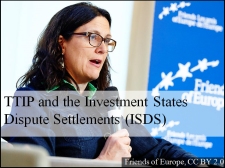Commentary by Jeanne MARTIN
The Transatlantic Trade and Investment Partnership (TTIP) is believed to be the magical cure to the EU’s slowing economic growth: it will not only boost our economies but also reduce unemployment and cut red tape. Amazing. But wait – if this is true, why have more than 3.35 million EU citizens (myself included), 518 EU civil society organisations, thousands of municipalities and more than 200 MEPs publicly opposed TTIP?

The European Commission argues that TTIP will boost our economies. It support its argument by a study made by the Centre for Economic Policy Research, commissioned by the European Commission itself. When reading this study, I expected to find evidence of the significant benefits that TTIP would bring to us. The reality was much different. Indeed, the study concludes that in the best-case scenario, the projected gains are a 0.5% increase in GDP and an extra €545 in disposable income for a family of four by 2027. Or €131 per person. Yes, you read me correctly. Either we have another conception of what “significant benefits” are or this is not impressive at all.
This best-case scenario rests on a whole set of unrealistic assumptions, such as the complete removal of tariffs by 2017, and ignores costs such as the costs of ISDS cases (an issue addressed below) or of tariff reductions (reducing government revenues). It also assumes the existence of a redistributive mechanism that would ensure that we all benefit from TTIP. In other words, this best-case scenario will probably never happen.
So economic growth will be quite limited. What about the reduction in unemployment? Well here again, there might have been too much excitement surrounding this issue. The European Commission’s 2013 impact assessment report on TTIP recognises that there will be a “prolonged and substantial” displacement of EU workers due to TTIP. It also states that workers who lose their jobs because of TTIP will probably remain unemployed and thus encourages EU member states to create structural support funds to compensate those that lose their jobs as a result of TTIP. In other words, EU member states will have to set up funds to compensate those that will be chronically unemployed due to an agreement supposed to reduce unemployment and increase people’s wealth. Interesting.
Now, Article 23.1 of the Universal Declaration of Human Rights and the Charter of Fundamental Rights of the EU, both ratified by each member state, state that everyone has the right to work and be protected against unemployment. The respect of human rights is a core value of the EU. Why would they ever allow a treaty that threatens those rights? Is there anything else at stake? Well, apart from selling our democratic standards off to multinationals, not much.

One of the major resolutions of TTIP is the Investor State Settlement Dispute (ISDS) mechanism. The ISDS basically allows companies to sue governments over laws that affect their profits, even if these laws are socially and environmental beneficial. For example, the Swedish energy company Vattenfall sued the German government through an ISDS for issuing standards for the management of wastewaters. Vattenfal argued that this measure threatened the economic viability of their projects and asked for a compensation of €1.4 billion. It settled the case when Germany decided to reduce its environmental standards. This is only one example out of many. This privatisation of law making is not compatible with democracy. By including ISDS in TTIP, EU Member States are transferring part of their sovereignty to multinational companies. I don’t know about you but I am not ready to sell my right to a more socially and environmentally fair world in exchange for greater profits by multinational companies.
And I am not the only one. In fact, on Jul the 15th, the Commission hold a public consultation on ISDS. It received more than 15,000 replies – a response unseen since the creation of the EU! 97% of the replies opposed the inclusion of ISDS in TTIP. As a result, Cecilia Malmstrom, the EU Trade Commissioner, proposed a new system called the Investment Court System. Funnily enough, while this reform plan now allows government to appeal the decision of the private court, the concept of private arbitration for foreign investors remains intact. In the words of the Green/EFA MEP Ska Keller “The system being proposed by the Commission has another name and some structural differences but it retains all the hallmarks of the deeply flawed ISDS system: it would remain a private arbitration body, outside the legal system, created for the benefit of corporations to challenge state authorities and democratically-approved laws.”
You may ask how this unbelievable situation came about? The answer is simple: secrecy. TTIP negotiations are not conducted in a transparent manner and key documents are kept away from most people. Even MEP members of INTA, the international trade committee of the European Parliament, do not have access to the full set of documents being negotiated. When access to key documents is granted, MEPs have to read them inside reading rooms in Brussels and Washington. Before entering the room, they have to sign a 14-page document binding them to silence and leave all of their possessions at the door. They cannot take notes and cannot tell anyone about what they read – not even their constituents or colleagues – as doing so would be considered an act of espionage. Indeed, this secrecy prevents citizens and MEPs from being fully informed and effectively engaging in the political process, undermining democracy. Furthermore, most consultations held by the European Commission since the beginning of the negotiations were with private companies and their lobby groups (119 out of the 130 consultations). Citizens will only have access to the text once deal is done. Since the beginning, the framework of the treaty is designed to benefit multinationals at the expense of our democratic standards. But how can the TTIP negotiations be considered democratic when the very ones that will be affected by their outcome can’t access the negotiating text? And why are citizens discriminated against businesses?

Now let’s examine the final argument: that TTIP will reduce red tape and facilitate investments by aligning regulations in the US and the EU. As tariffs are already quite low in both the US and the EU, it is believed that 80% of the benefits from TTIP will come from harmonising standards. The European Commission has assured us that this could only lead to a levelling of standards, but the evidence pushes to the contrary. Firstly, rather than cut red tape, TTIP will lengthen the time taken to raise standards and introduce new ones. The EU will have to consult the US, and foreign investors will be able to stop and/or weaken regulations, further complicating the process. Secondly, a Regulatory Co-operation Committee, composed of companies’ representatives and state actors, will be in charge of the harmonisation of standards, inter alia. To do so, it will be given rights to interfere with every stage of policy-making by governments and will have the ability to override government’s decisions. Once again, granting companies the right to weaken our standards if it harms their ability to make profits. And this is already happening! For example, the EU is now planning to lift a ban on imports of chickens washed in PAA, an acid disinfectant and known skin, eye and lung irritant, due to intense pressure by the US government and US chicken producers. Thirdly, in cases where the US and the EU can’t agree on a mutual standard, both will be able to continue with their own. Thus, EU companies will face unfair competition when they have to comply with higher social and environmental standards. This is likely to result in pressure to lower those standards.
The choice is ours. Do we accept to sell our democracy to multinationals, or do we actually come up with a treaty that fosters cooperation and economic growth, without giving up on these standards? Getting our voices heard will not be easy. But it is feasible. We must do everything to force the European Commission to listen to its citizens. We need to stand together and pressure MEPs into rejecting TTIP. We need to raise awareness of TTIP, and sign and share the petition by the European Citizens Initiative against TTIP. A version of this petition – with a preliminary final count of 3,263,920 signatures – was delivered to the European Court of Justice last month. Let’s show the ECJ that we are not ready to give up on our strong social and environmental standards for €131. And even if the European Parliament ratifies TTIP, EU governments will have to decide whether they approve it or not. This means that we can induce them to veto TTIP. And it is crucial that we do.
RELATED ARTICLES:





